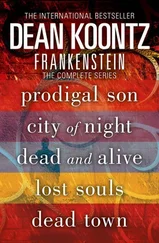Before leaving the motel, Junior quickly scanned four thousand more names in the phone book, seeking Bartholomew. The previous day, confined to this room, he'd sought his enemy through twelve thousand listings. Cumulatively, forty thousand had been searched.
On the road again, with no luggage other than the boxed works of Caesar Zedd, Junior drove south toward San Francisco. He was excited by the prospect of city life.
His years in sleepy Spruce Hills had been rich with romance, a happy marriage, and financial success. But that small town was lacking in intellectual stimulation. To be fully alive, he must experience not merely physical pleasures aplenty, not only a satisfying emotional life, but a life of the mind, as well.
He chose a route that brought him through Marin County and across the Golden Gate Bridge. The metropolis, which he had never before visited, rose in splendor on hills above the sparkling bay.
For one glorious hour, he followed an impetuous, random route through the city, marveling at the architecture, the stunning vistas, the thrilling plunge of the steeper streets. Soon Junior was as drunk on San Francisco as ever he had been on wine.
Here, intellectual pursuits and prospects for self-improvement were unlimited. Great museums, art galleries, universities, concert halls, bookstores, libraries, the Mount Hamilton observatory Less than a year ago, at a cutting-edge establishment in this very city, the first topless dancers in the United States appeared onstage.
Now this compelling art form was practiced in many major cities, which had followed San Francisco's avant-garde daring, and Junior was eager to enlighten himself by attending such a performance right here where the dance innovation of the century had been born.
By three o'clock, he checked into a famous hotel on Nob Hill. His room offered a panoramic view.
In a fashionable men's shop off the lobby, he purchased several changes of clothes to replace what had been stolen. Alterations were completed and everything was delivered to his room by six o'clock.
By seven, he was savoring a cocktail in the hotel's elegant lounge. A tuxedoed pianist played romantic music with high style.
Several beautiful women, in the company of other men, flirted surreptitiously with Junior. He was accustomed to being an object of desire. This night, however, the only lady he cared about was San Francisco herself, and he wanted to be alone with her.
Dinner was available in the lounge. Junior enjoyed a superb filet mignon with a split of fine Cabernet Sauvignon.
The only bad moment in the evening came when the pianist played “Someone to Watch over Me."
In his mind, Junior saw a quarter turning knuckle over knuckle, and he heard the maniac cop's droning voice: There's a fine George and Ira Gershwin song called “Someone to Watch over Me. “ You ever hear it, Enoch? I'm that someone for you, although not, of course, in a romantic sense.
Junior had almost fumbled his fork when he recognized the tune. His heart raced. His hands were suddenly clammy.
From time to time, customers had crossed the cocktail lounge to drop folding money into a fishbowl atop the piano, tips for the musician. A few had requested favorite — tunes.
Junior hadn't paid attention to everyone who visited the pianist though surely he'd have noticed a certain stump in a cheap suit.
The lunatic lawman was not at any of the tables. Junior was sure of that, because indulging his appreciation for lovely women, he had roamed the room repeatedly with his gaze.
He hadn't paid close attention to those patrons seated at the bar behind him. Now, he turned in his chair to study them.
One manly woman. Several womanly men. But no blocky figure that could have been the crazed cop even in disguise.
Slow deep breaths. Slow. Deep. A sip of wine.
Vanadium was dead. Pounded with pewter and sunk in a flooded quarry. Gone forever.
The detective wasn't the only person in the world who liked “Someone to Watch over Me.” Anyone in the lounge might have requested it. Or maybe this number was part of the pianist's usual repertoire.
After the song concluded, Junior felt better. His heartbeat soon returned to normal. The damp palms of his hands grew dry.
By the time he ordered crème brulee for dessert, he was able to laugh at himself. Had he expected to see a ghost enjoying a cocktail and free cashews at the bar?
WEDNESDAY, fully two days after delivering honey-raisin pear pies with Agnes, Edom worked up the nerve to visit Jacob.
Although their apartments were above the garage, back to back, each was served by a separate exterior staircase. As often as either man entered the other's domain, they might as well have lived hundreds of miles apart.
When together in Agnes's company, Edom and Jacob were brothers, comfortable with each other. But together, just the two, no Agnes, they were more awkward than strangers, because strangers had no shared history to overcome.
Edom knocked, Jacob answered.
Jacob backed away from the threshold, Edom stepped inside.
They stood not quite facing each other. The apartment door remained open.
Edom felt uneasy in this kingdom of a strange god. The god that his brother feared was humanity, its dark compulsions, its arrogance. Edom, on the other hand, trembled before Nature, whose wrath was so great that one day she would destroy all things, when the universe collapsed into a super dense nugget of matter the size of a pea.
To Edom, humanity was obviously not the greater of these two destructive forces. Men and women were part of nature, not above it, and their evil was, therefore, just one more example of nature's malignant intent. They had stopped debating this issue years ago, however, neither man conceding any credibility to the other's dogma.
Succinctly, Edom told Jacob about visiting Obadiah, the magician with the mangled hands. Then: “When we left, I followed Agnes, and Obadiah held me back to say, 'Your secret's safe with me.'”
“What secret?” Jacob asked, frowning at Edom's shoes.
I was hoping you might know,” said Edom, studying the collar of Jacob's green flannel shirt.
“How would I know?"
“It occurred to me that he might have thought I was you."
“Why would he think that?” Jacob frowned at Edom's shirt pocket.
“We do look somewhat alike,” Edom said, shifting his attention to Jacob's left ear.
“We're identical twins, but I'm not you, am I?"
“That's obvious to us, but not always to others. Apparently, this would have been some years ago."
” What would have been some years ago?"
“When you met Obadiah."
“Did he say I'd met him?” Jacob asked, squinting past Edom toward the bright sunlight at the open door.
“As I explained, he might have thought I was you,” Edom said, staring at the neatly ordered volumes on the nearby bookshelves.
“Is he addled or something?"
“No, he's got all his wits."
“Supposing he's senile, wouldn't he possibly think you were his long- lost brother or someone?"
“He's not senile."
“If you ranted at him about earthquakes, tornadoes, erupting volcanoes, and all that stuff, how could he mistake you for me?"
“I don't rant. Anyway, Agnes did all the talking."
Returning his attention to his own shoes, Jacob said, “So ... what am I supposed to do about this?"
“Do you know him? “ Edom asked, gazing longingly now at the open door, from which Jacob had turned away. “Obadiah Sepharad? “
“Having spent most of the last twenty years in this apartment, not being the one who has a car, how would I meet a Negro magician?"
“All right then."
As Edom crossed the threshold, moving outside to the landing at the top of the stairs, Jacob followed, proselytizing for his faith: “Christmas Eve, 1940, St. Anselmo's Orphanage, San Francisco. Josef Krepp killed eleven boys, ages six through eleven, murdering them in their sleep and cutting a different trophy from each-an eye here, a tongue there."
Читать дальше











